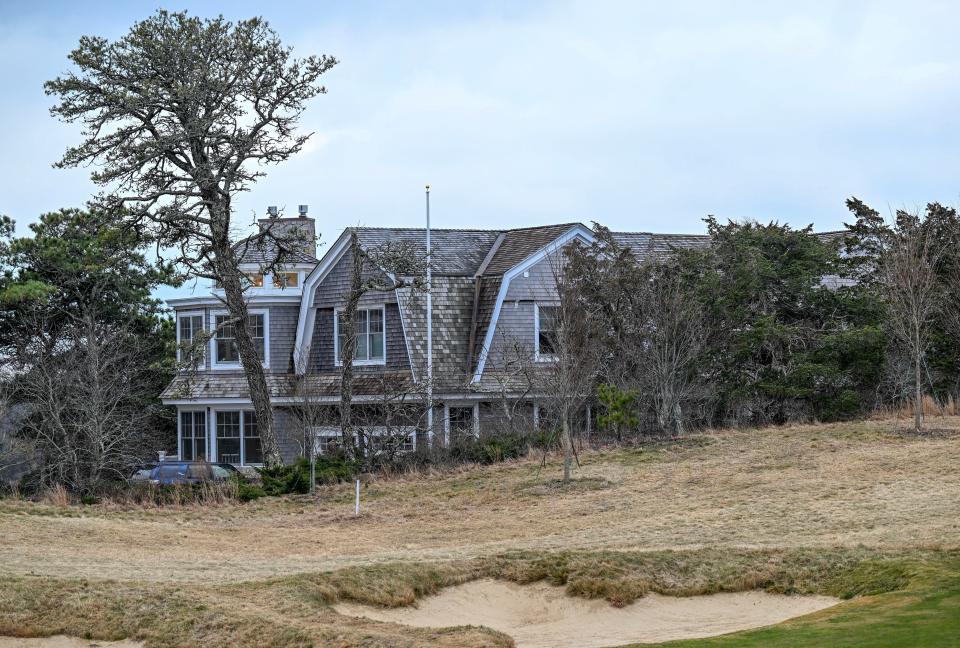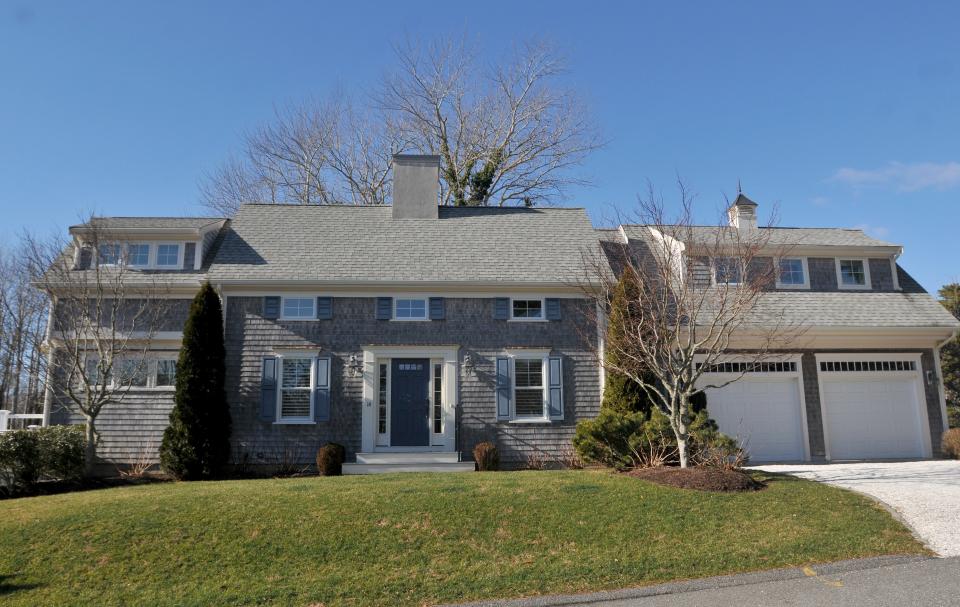A house divided: What is fractional ownership? Islands, Cape Cod brace for latest trend
CHATHAM — A sprawling five-bedroom, 10-bathroom mansion at 558 Fox Hill Road perched along picturesque Crows Pond offers a prime example of a growing real estate trend that is unsettling Cape officials.
Pacaso, a three-year-old San Francisco start-up founded by former Zillow executives, bought the 11,000-square-foot house as its first Cape Cod listing on May 3, 2022 for $10.1 million, according to the assessor's office. Its website now advertises one-eighth ownership shares for $1.59 million.
The most recent buyer hails from the South and has grandchildren who live locally on the East Coast, according to a Pacaso spokesperson.
The model is called "fractional home ownership," and local officials, especially on Nantucket and Martha's Vineyard, are scrambling to regulate it.

Edgartown Planning Board Chairwoman Lucy Morrison said she found the concept intriguing but worried the Cape and Islands' fragile housing market is not the right fit.
"Our housing stock is under just so much pressure from people that aren't people," said Morrison. "People are struggling to stay where they were born and getting priced out by corporations that can put down just ridiculous amounts of cash."
The median sales price for a single-family home in Chatham for May 2022 was $1.49 million, according to data from the Cape Cod Commission. Warren Group data listed the median sale price for a single-family house for December 2023 as $1.27 million for Edgartown, $794,500 for Tisbury, and $2.36 million for Nantucket.
What is fractional ownership?
Fractional ownership companies like Pacaso and Colorado-based Lifestyle Asset Group buy expensive homes in resort destinations, like the Cape and Islands, sunny Los Cabos, or top ski destination Vail, and creates a limited liability company, or LLC, for each property.
The houses are sliced into fractional ownership shares and sold to multiple buyers for whom traditional second home ownership may be out of reach.
When the home has been fully sold, Pacaso does not retain any ownership and instead acts as a property manager.
Owners, often strangers, can stay overnight up to 44 days a year, but not longer than 14 days in a row, according to Pacaso's website.
Each owner, during their stay, occupies the entire house.
What if an owner wants to sell their share?
The most significance difference between Lifestyle Asset Group and Pacaso is the exit strategy.
With Lifestyle Asset Group, the term of co-ownership is defined in the legal documents as between five to 10 years, according to the website. When the term ends, the home is sold, either on the market through a real estate agent or to one of the existing co-owners, and sale proceeds are distributed to the co-owners.
With homes where all ownership interests have been sold, Pacaso owners can sell their ownership interest at any time. If units are still pending, owners can sell their interest after a year of ownership.
Each owner has the independent control over the sale of their share, according to the website.
While co-ownership is not a new concept, the platforms boast that they streamline the process. Property managers are on hand to untangle maintenance issues and cleaning, and homes come fully furnished by a design team.
Pacaso argues it's helping to blunt the housing crisis by reducing competition for middle-tier homes and steering buyers toward luxury homes. Most people who own second homes only use it four to six weeks each year, said Whitney Curry, Pacaso chief marketing officer.
"Whereas with Pacaso, homes are occupied nearly 90% of the year," she said. "And that consistent occupancy supports the local economy and local jobs." Pacaso serves almost like "carpooling, where we consolidate demand into fewer houses and make better use of our existing housing stock," she said.
Central question: timeshares or co-ownership?
Robert Giese owns a Nantucket house on a quiet dead-end cul de sac near a sleek, six-bedroom house on Meadow Lane that Pacaso has dubbed "Cedar Isle." The company bought the house on Sept. 12, 2022 for $8.25 million and has just one share left for $1.35 million, as of Tuesday morning.
"It's not very residential, it's a commercial use of the property basically," said Giese. "I really don't want a hotel by me."
Shortly after Pacaso began advertising the property, Nantucket's zoning enforcement officer sent a letter to chief executive officer Austin Allison saying that time-sharing amounted to a "transient residential facility," which is banned in residential zoning districts.
Pacaso filed an appeal with the Zoning Board of Appeals, but later withdrew the request. The company insisted it is not selling timeshares and thus the bylaw does not apply.
"Pacaso is real estate property ownership. A timeshare, you don't own real estate, you own a right to use time in a property," said Curry. "At its core, that is the most fundamental difference."

Municipalities take steps to restrict fractional ownership
Unconvinced, local officials are moving to amend zoning bylaws to specifically include language about fractional ownership, said state Sen. Julian Cyr, D-Truro.
"What we've seen emerging is our municipalities moving to regulate or restrict commercial fractional ownership, and they're doing so either by adding specific language that references fractional ownership or interval use into existing timeshare bylaws or adopting a combination of a timeshare, fractional ownership, interval use bylaw," said Cyr.
Tisbury and Provincetown residents have passed amended zoning bylaws to limit fractional ownership to just business districts, while Edgartown and Nantucket will mull a similar change at spring town meeting this year.
Officials from those communities say they have few, if any, fractional ownership properties but hope to set restrictions on the trend before it accelerates.
"We said, 'Look, if we can get a bylaw on the books now, we're not going to end up dealing with the ones that are already out there and having to essentially grandfather them in or negotiate it away,'" said Tisbury Planning Board Chairman Ben Robinson.
The business model also means fractional ownership is not subject to the short-term rental tax, Cyr noted, because it's not considered a rental of the property but co-ownership.
'I'm interested in having neighbors'
On Sunday, Feb. 4, Pacaso listed a new "hot prospect" on Nantucket at 11 Fawn Lane, with one-eighth shares estimated at $552,000.
The model is based off buyer demand, said Curry, the Pacaso chief marketing officer. The company explores buying more properties if it sees an increase in requests for a certain area, and expand elsewhere if not.
"Our mission here at the company is to enrich lives by making second homeownership possible and enjoyable for more people," said Curry. "We deliver by making the price point and barrier to entry through co-ownership less."
Cyr, though, said the trend threatens to exacerbate a dire housing crisis and further escalate real estate costs that are already sky-high. More than half of the properties on the Cape and Islands are second homes and most real estate transactions are either second or third homes or for investment properties, he said.
"Locals just simply can't compete," said Cyr.
Giese, the home owner on Nantucket, said he worries how the practice could harm his neighborhood.
"I'm interested in having neighbors," said Giese. "It takes away the community aspect of the street."
Zane Razzaq writes about housing and real estate. Reach her at zrazzaq@capecodonline.com. Follow her on X @zanerazz.
Gain access to premium Cape Cod Times content by subscribing.
This article originally appeared on Cape Cod Times: New real estate sales trend on Cape, Islands helps economy, agent says

